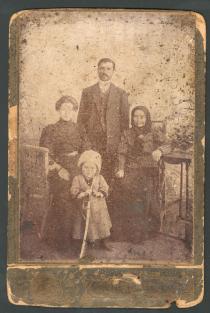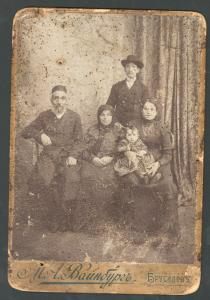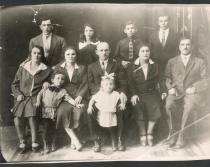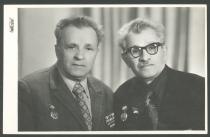From left to right: my paternal grandfather Bentsij Levitas; my paternal grandmother; my Daddy, Yankel Bentsionovich Levitas; I; my Mom, Hanna Peisakhovna Levitas.
The name of my paternal grandfather was Bentsij Levitas. He was a hatter. He had five sons and two or three daughters. I don’t remember what my grandmother’s name was. The parents of my father were born in Brusilovo. Unfortunately, that’s all I remember about my father’s parents.
My father, Yankel Bentsionovich Levitas, was born in 1881 or 1882 in Brusilovo. Father finished сheder, then became a hatter. His brothers were tailors and blacksmiths. Four of his brothers left for America when I was two or three years old. One of his brothers lived in Canada and was engaged in construction of trams, what the others did I do not know. My father wasn’t able go away as he didn’t have enough money for it. Those of his brothers left, whose work turned out to be more profitable and who were able to make some money. The sisters remained with my father.
My mother’s name was Hanna Peisakhоvna Levitas, nee Lakhterman. Mom, too, finished сheder. She worked as a dressmaker and when my parents got married, Father also became a tailor. Our family was of an average well-being.
Jewish traditions were strictly observed in our family. All our women would always wear kerchiefs. We observed Sabbath. On Saturday we went by foot to the synagogue, because during Sabbath it was prohibited to ride. The synagogue was situated not far off. At all times we went there by foot. Our borough was a small one, with a population of about 20,000. There was only one synagogue. It was a small synagogue, for about twenty persons. We frequently went to the synagogue. The synagogue was also a place of communication.
It was also prohibited to work until the end of Saturday. We used to have a big feast on these days, where they necessarily served stuffed fish, though fish was rare where we lived. Fish was bought at the local market. Russians used to come to our place on Saturdays and for a little money they did the work, that couldn’t be done by Jews on Saturdays: put the lights on and off and so on.




